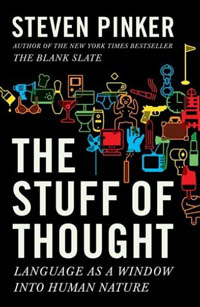“Words are wise men’s counters, they do but reckon by them; but they are the money of fools.” – Hobbes
 The Stuff of Thought |
I once had a conversation with a girl that went like this:
“Ryan, you’re a bama.”
“What’s a ‘bama?’”
“It’s… you know… what you are.”
“That makes no sense.”
“A bama’s a bama, and you’re a bama.”
“You can’t use a word to define itself.”
She shrugged, “Well, that’s what you are.”
The conversation went in circles like this, never making it anywhere, but it does raise questions about how new words enter our lexicon and how they derive their meanings. The semantics of language are an often debated subject in politics and law, as with the lawsuit over whether the World Trade Center attacks constituted one or two “events”, which affected the insurance pay off by billions of dollars.
This is the subject Stephen Pinker tackles in The Stuff of Thought, the third book in his trilogy on language. As with The Blank Slate, there were numerous inaccuracies in Pinker’s writing, but I was more forgiving of them as his politics were much tamer in this book. Reading Stephen Pinker is like reading spaghetti, anecdotes here, references to future chapters there, digressions abound, overly erudite at times and mind-numbingly thorough at others. But reading Pinker is an overall rewarding experience, and his style works for this subject.
I come away from Pinker’s books with a plethora of new anecdotes. In TSoT I learned that the Turkish language has an inferential tense, which communicates whether something was learned firsthand or as hearsay, a proof for the theorem that a horse has an infinite number of legs, and all the Beatles symbolism surrounding the death of Paul McCartney. In English we describe time as forward and backwards, the Chinese phrase it as up and down, and the Aymara describe the future as coming up from behind us, which makes sense metaphorically. Creationists and Evolutionists have a very different definition of the word “species,” with Creationists taking a view that includes strict boundaries between different animal types, and Evolutionists seeing a blending of characteristics from one form to another.
All of these anecdotes raise interesting questions about language. Does a culture’s language restrict what it may think about? If Paul McCartney died in 1966, and someone else took his place, then what does the name “Paul McCartney” refer to? Were the WTC attacks one or two events? Are the differences between Evolutionists and Creationists a reflection of a relative worldview butting heads with a dichotomous one?
A section on baby name fads was fascinating, as people try to choose uncommon names, and, in doing so, inadvertently choose a name that will be common. Consider all the brainiacs named “Steve” in science literature (Hawking, Gould, Pinker, Project Steve), or consider how names like Ethel, Ruth, and Agnes make us think of old people, but these names were simply popular when these people were born. You can check with the Social Security Administration to find out what names will be the “old people” names of the future.
Pinker explores how much of our language is programmed, with examples like the fact that swearing in our own language is more cathartic and that there is an instinctive basis for swearing. An entire chapter on swear words both defends the fact that swear words aren’t intrinsically worse than any other, and upholds the restriction on their use, as their cathartic effect would be dampened and language cheapened if everyone started using them all the time. I also learned the origins of words like “jerk” and “scumbag,” which are no longer considered especially offensive, but would be if people knew what they refer to.
Then there’s the part I personally find confusing, the way people speak indirectly. How, instead of telling someone to pass the green beans, we ask them if they could pass the green beans. Or how it is considered completely offensive to request a sexual encounter with someone, so the appropriate thing to do is ask them in for coffee or a nightcap. A year after my “bama” conversation, I was in a clothing store and overheard the following:
“What’s a ‘bama?’”
“It’s what you are.”
“I don’t get it.”
The young couple paused when they noticed me smiling knowingly at their exchange before moving on. It had finally clicked with me what a “bama” was.
It was an excuse to flirt.
Note: The UrbanDictionary has several definitions for “bama”, one of them mentions the phrase being local to Washington DC, where both of these conversations took place.
Comments
6 responses to “Stephen Pinker’s The Stuff of Thought”